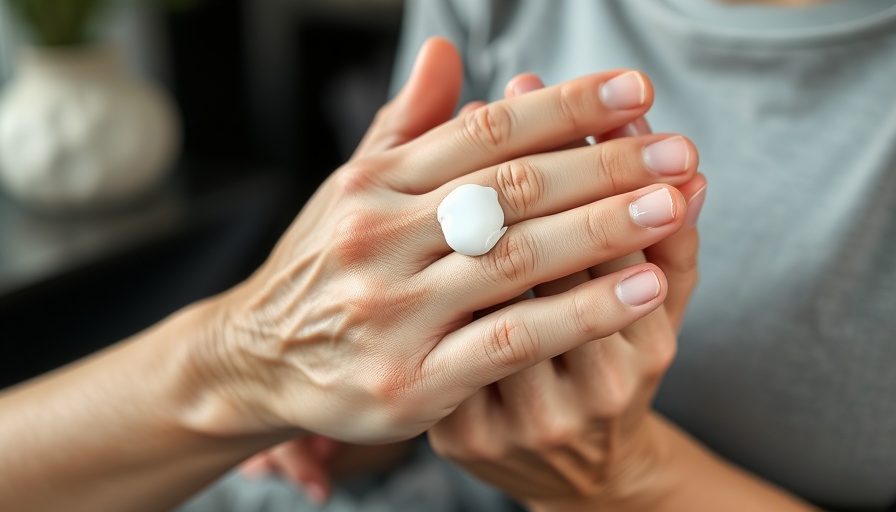
Understanding the Roots of Crepey Skin
As we age, our skin goes through a myriad of changes, and it's normal for it to lose some elasticity and thickness. Much of the skin's transformation results from factors such as genetics, lifestyle choices, and environmental influences. A common issue many people face is crepey skin, characterized by a fine, wrinkled texture that often resembles crepe paper.
This phenomenon occurs when the skin loses its ability to maintain moisture and firmness. According to Dr. Jeremy Brauer, a board-certified dermatologist, sun damage is primarily responsible for this condition, often making skin thinner and more fragile.
The Role of Sun Damage: A Major Contributor
The sun plays a significant role in the aging process of our skin. In fact, studies show that up to 80% of visible aging signs, including crepey skin, stem from unprotected UV exposure. Dermatologist Dr. Divya Shokeen emphasizes that individuals who frequently spend time in the sun without proper protection are at a higher risk of experiencing crepey skin even in their 20s and 30s. This exposure damages the skin’s collagen and elastin, two vital proteins that help maintain skin structure and elasticity.
Hydration and Its Importance
Another crucial aspect to consider is the hydration levels of the skin. As we get older, our skin’s natural moisture diminishes. Maintaining adequate hydration is essential, as it promotes elasticity and a youthful appearance. For individuals managing conditions like diabetes or high cholesterol, understanding the role of hydration becomes even more significant. Some people experiencing these conditions may find their skin becoming drier, necessitating a more diligent skincare routine.
Effective Natural Solutions for Crepey Skin
Fortunately, there are several natural solutions that can help combat crepey skin. Here are a few strategies to consider:
- Moisturize Regularly: Use creams or lotions rich in hyaluronic acid or glycerin, which are excellent for hydrating the skin.
- Incorporate Antioxidants: Foods high in antioxidants—like berries, dark leafy greens, and nuts—can protect skin cells from oxidative stress caused by sun damage.
- Utilize Natural Oils: Oils such as jojoba or almond oil can nourish and moisturize the skin, improving its texture.
- Consume Healthy Fats: Omega-3 fatty acids found in fish, nuts, and seeds are essential for skin health, helping to maintain its elasticity and hydration.
- Limit Sugar Intake: High blood sugar can contribute to glycation, a process that damages collagen and leads to premature aging. Managing sugar intake through a balanced diet can thus be beneficial.
Broader Lifestyle Changes Affecting Skin Health
The pursuit of a healthy lifestyle impacts not just overall health but also the quality of your skin. Conditions like diabetes and high cholesterol can affect blood flow and, subsequently, skin health. Engaging in regular physical activity helps improve circulation, delivering essential nutrients to the skin while promoting detoxification.
Additionally, practices such as intermittent fasting have gained popularity for their potential health benefits, including skin improvement. By allowing the body to rest from constant digestion, this practice could promote cellular repair and rejuvenation.
Emotional Well-Being and Skin
Don't underestimate the connection between mental health and skin condition. Stress can lead to hormonal fluctuations that exacerbate skin issues. Approaches to manage stress—like mindfulness, yoga, or even simple breathwork—can significantly contribute to skin vitality. Healthy relationships and social connections play a role in enhancing emotional well-being, which in turn can reflect positively on your skin.
Future Predictions: Evolving Skincare Practices
As we delve deeper into the future of skincare, we expect an increase in natural and sustainable products designed with clean ingredients. Today’s consumers are increasingly looking for solutions that not only promise results but also align with their ethical beliefs. Expect innovations that effectively integrate nutrition, skincare, and overall wellness, catering especially to those managing chronic health conditions.
Taking Action: Personalized Skincare Regimens
Taking the first step towards combating crepey skin requires an understanding of your unique skin needs. Consult with a dermatologist to explore personalized options that suit your health status and skin conditions, especially if you are dealing with complications related to diabetes or high cholesterol.
Ultimately, your skin is a reflection of your overall health. Invest in it by adopting practices that align with your lifestyle and health goals.
Call to Action: If you’re looking to revamp your skincare regimen to address issues like crepey skin, consider implementing some of the natural remedies mentioned above and consult a healthcare professional to tailor a plan that accommodates your specific health needs.
 Add Row
Add Row  Add
Add 



 Add Row
Add Row  Add
Add 


Write A Comment